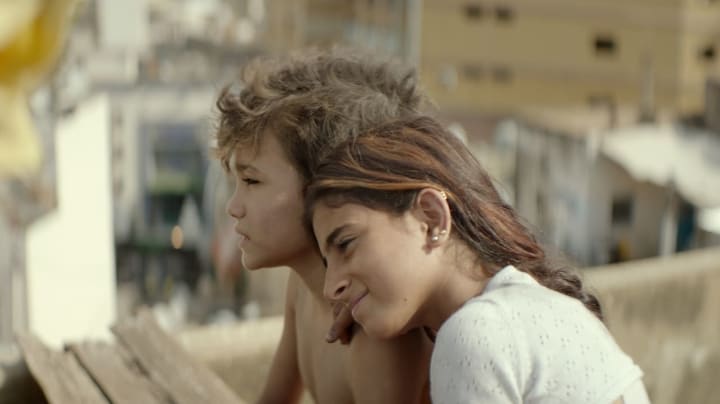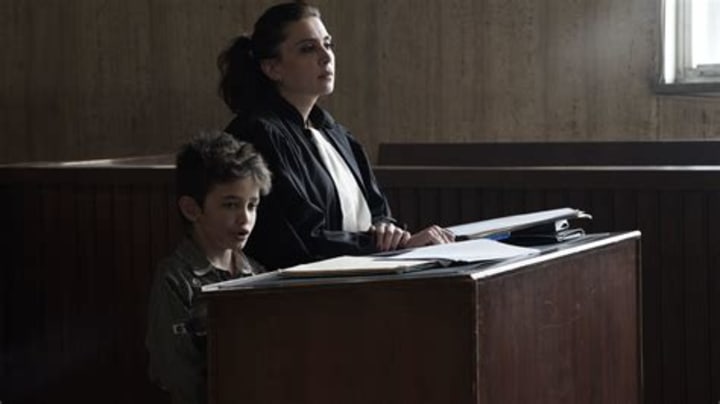CAPERNUM - A REVIEW
The Killing of a Childhood Dream

It is truly a fascinating matter when one is able to witness the evolution of a director over the course of a decade. Nadine Labaki, Lebanon’s diamond in the rough filmmaker, has constantly strived for putting her passion on the map and directly put a spotlight on her nation.
Eight years have passed since Labaki’s last film, and CAPHARNAÜM is worth the wait.
The film recounts the journey of 12-year-old Zain, who decides to sue his parents for having brought him into this world when they can’t raise him properly, even if only to give him love.
In many ways, CAPHARNAÜM is an allegory about the abusive current state of affairs in Lebanon.

Through Zain’s eyes, the audience witnesses the inevitable death of childhood and dreams in a country whose government has reached the peak of neglecting its people.
With every new obstacle that arises, Zain fights for a better tomorrow, slowly stripping away his soul and as a result growing up way faster than he should while trying to keep some sense of his identity alive.
It is no coincidence that Zain, an alien in his own country, reaches a point where he wants to leave his home, his family, his entire being and go somewhere where there is some hope – words that every Lebanese soul utters at least once a week.
From the financial struggles, to those of basic human needs (electricity, clean water, food) Zain has to face life with nothing but his unyielding spirit.
There is, however, another layer to this film and that layer lies behind the camera.
While watching this film, one cannot help but notice the enraged way that CAPHARNAÜM presents itself.

If Zain is the soul of the film, then Nadine’s vision is its heart – for only the broken and furious heart of a resilient mother could bring forth a tale of this nature to the screen.
The meticulous attention to the arduous existential, emotional, and physical journey that Zain goes on is cared for in a very maternal way and this strengthens the film ten-fold.
Cinematographically, Christopher Aoun astounds with every frame.
With the level of realism that Aoun is able to ground the film within, one can make an argument that the film could easily pass for a documentary, though clearly it is a work of fiction.
His camera toys with the audience constantly challenging perspective from being utterly distant and almost ignorant, to then being up close and completely personal – another parallel to how we as human beings deal with the harsh realities of our times.
A camera, however, is nothing without a subject worth looking at.
The film’s cast delivers unforeseeable performances, yet the standing ovation goes to none other than Zain Al Rafeea who plays the film’s protagonist of the same first name.
Al Rafeea does not act throughout the film, he simply is.

For a young boy his age to embody the character he plays with the level of professionalism that he does, alone makes the film worth the watch.
He carries the weight of the film upon his shoulder and delivers.
As with all art, some aspects of it have to be questioned and critiqued, yet the only aspect of the film that will garner this questioning is its runtime.
CAPHARNAÜM is a lengthy two hours and three minutes, and though in comparison with other films that have recently been released, it is not that long, its content does make its length quite noticeable.
There are, nonetheless, two arguments for the film’s length: one is positive and the other is not.
To begin with the negative, when one takes an audience on a journey that will be filled with pain, misery, and ugliness – one has to take into consideration that loss of empathy or patience might occur.
There are times when even I questioned the film’s length, whether a scene was necessary or not, and whether its removal to shorten runtime would at all affect the film’s themes or narrative.
The answer to those questions would be purely subjective.
On the other hand, what is a film if not a dramatization of life and if Victor Hugo wrote an almost two-thousand-page novel entitled Les Miserables, which recounted the trials and tribulations of a nation’s people, why can’t a Lebanese storyteller make a two-hour long film about the sorrows and at times unfairness of life?
CAPHARNAÜM never shies away from the misery that some Lebanese non-citizens face, challenges its audience to witness the painful truth, and question every fiber in its being.
One of the biggest problems that the majority of Lebanese films face is that none seem to ever deliver on proper third acts and more specifically satisfying endings.
Thankfully, Labaki places her idealism, and her hopes into the film’s final moments and in doing so offers her audience an ending that makes for an unforgettable experience.
CAPHARNAÜM continues Lebanon’s recent uphill climb towards making cinematic history and more importantly making Lebanon known and respected in the world of cinema.
About the Creator
Alan Mehanna
- 🎬 AwardWinning #Screenwriter
- 🗡️#FantasyGeek
- 🎙️#Podcaster
- 📺#SeriesLover
- 📚 #Storyteller
- 🗯️#TedxSpeaker






Comments
There are no comments for this story
Be the first to respond and start the conversation.